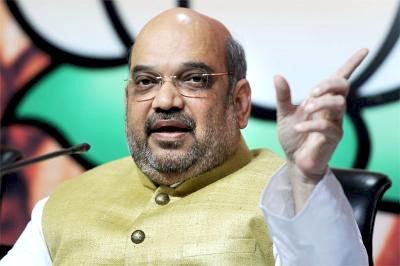Vrindavan, Mar 5: BJP chief Amit Shah today attacked Congress over the JNU row, saying it should be 'ashamed' of Rahul Gandhi's visit to the campus and questioned whether 'anti-national slogans' can be called freedom of speech.

"A strange atmosphere has been created. Anti-national slogans are being projected as freedom of expression... Congress should be ashamed that its vice president goes to the campus and says these (slogans) should be heard as there is freedom of expression.
"If these slogans are freedom of expression, then what is treason?" he said seeking Congress chief Sonia Gandhi's views on whether she agrees with her son on this.
Shah asked party workers to work hard to ensure that it remains in power at the Centre for 25 years so that India could become the 'vishwaguru' as it was not possible in five years.
"In five years there could be development and high growth rate and borders could be made safe but if India has to be 'vishwaguru', then it is a must that BJP is in government for 25 years," he said.
Underlining party's Hindutva credentials, he said Prime Minister Narendra Modi attended Ganga aarti with pride and went to Pashupati Nath temple in Nepal to seek blessing.
The party wants India to have top IT and MBA professionals, who also seek their "inspiration" from Swami Vivekananda, he said.
The BJP chief also made fun of former Prime Minister Manmohan Singh to attack Congress and hail Modi's leadership, saying Singh visited more countries than Modi but his tours made little impact.
"He would read from two pages he carried with him which were written in English. At times, he would read the speech meant for Thailand in Malaysia and the one for Malaysia in Thailand... Modiji spoke in Hindi in the UN and the whole country felt proud," Shah said.
The biggest work the Modi government has done is to make the country's borders safe, he claimed.
Invoking a number of Centre's schemes aimed at welfare of youth and farmers, he said the government has made a beginning for "miraculous" change in the country.





Comments
thanks uncel amith for your divinely speech...............now its 100 percent sure how knowledgabel you are you fit good for post of joker.
BJP PLEASE STOP UR ADVISE FOR OTHERS , FRIST U NEED NEED TO CLEAR URSELF CREATING THE FAKE EDITED VIDEOS
THEN U R GIVING THE ADICE FOR OTHERS ...... WROST IDEA..
Anyway u people create JNU student leader to become a future leader of India...
dear you need to be ashamed for how you handled JNU case with doctored video. After this issue also educated people think about all the previous issues.
Add new comment